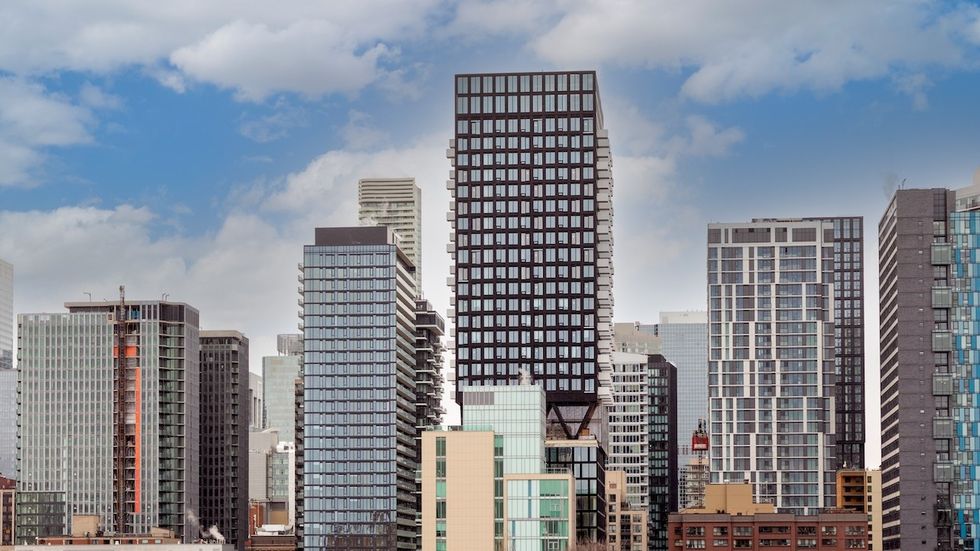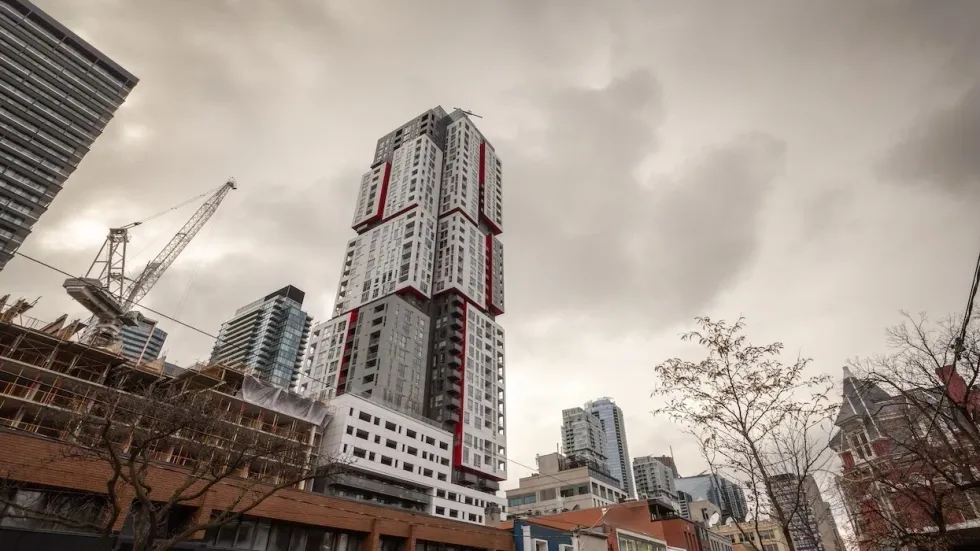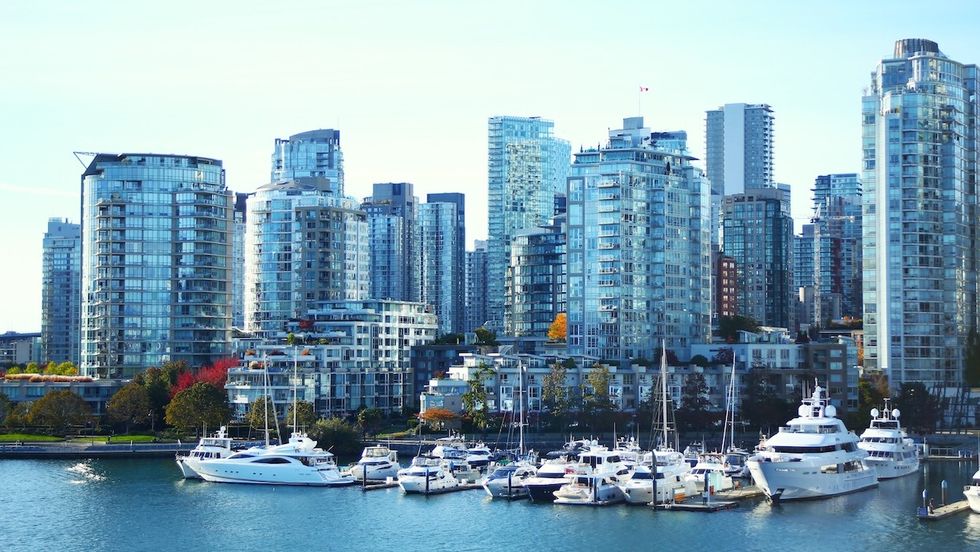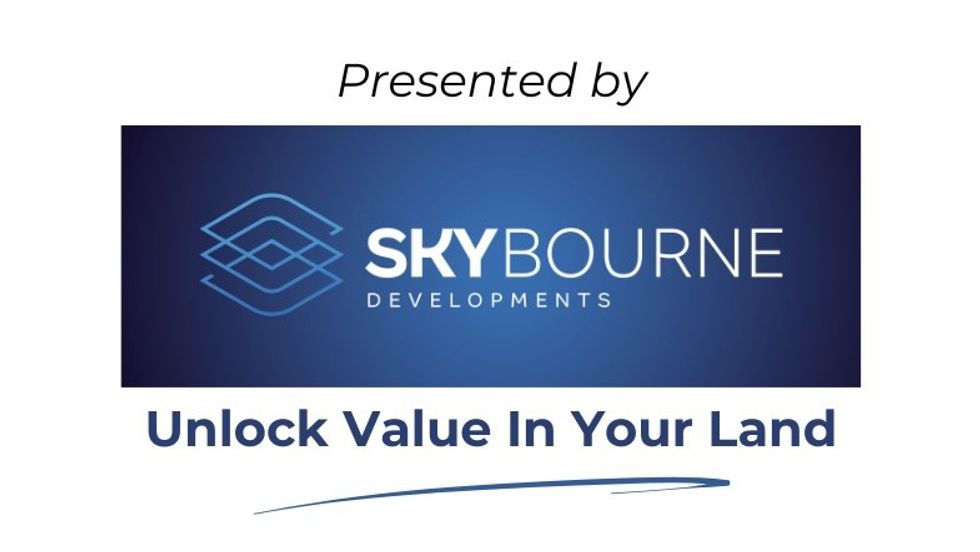‘Issue of the Year’ is part of STOREYS' annual editorial year-end series. You can find the rest of our 2024 selections here as they're released throughout the week.
Once hailed as ‘king,’ condos (in particular, new condos) in Canada’s most major markets have seen a dramatic fall from grace over this past year. Experts agree that a perfect storm of factors is to blame, headline-grabbing interest rates being just one of many, but also acting as the straw that broke the camel’s back. With the need for more housing plain in Canada, and condos being such a big part of the equation, there’s no minimizing the fact that the condo sector, set against the backdrop of a changed and challenged market, has gripped Canadians with an eye on real estate this year.
That all being said, there’s not really a ‘Canadian condo market,’ per se. What we’re talking about is individual condo markets in cities and regions across the country — like the Greater Toronto Area’s, for instance. So let’s start there.

This year did not start off on a good foot, so to speak, for condos in the GTA. We were 10 Bank of Canada interest rate hikes in when 2024 began, for one, which had already done a number on purchasing power and buyer sentiment. Residential real estate sales across the board were hit hard in that environment, but nothing was hit quite as hard as the new condo segment, where we had already seen some 40 projects that were on track to launch put on hold amid the “heightened market uncertainty.” (And that figure surged to 60 projects in the first quarter and 76 projects by July.)
“The resale condo market was slow this year, but nowhere near as slow as the presale market, which largely relies on investors,” says Urbanation President Shaun Hildebrand. “Total condo resales are on track for about 19,000 sales this year, which will likely be the lowest annual total since 2008 but within a reasonable distance of the 10-year average of about 24,000 sales.”
By contrast, he estimates that the region’s pre-sale condo market is on track to have its slowest year in almost 30 years, with fewer than 5,000 sales expected by year-end. That figure pales in comparison to the 10-year average of around 22,000 sales. “To say this is shaping up to be a slow year for the new condo market is an understatement,” he adds.
Hildebrand says that the “low point” in the year was observed in the third quarter, when only 567 new condo units were sold and only one new project was launched for pre-sales. “Normally, this time of year would see around 4,000 to 5,000 sales on average and about 15 to 20 launches,” he says. “To put these figures into perspective, there were more new condo sales during the first few months of the COVID lockdown and the global financial crisis than in Q3-2024.”
To that point, Mark Morris, Real Estate Lawyer with LegalClosing.ca, had been warning for months on his socials and in interviews that the new condo space — not just in the GTA, but in markets across Ontario — was in trouble, as was anyone with a stake in it. He maintains the same today.
“The people in the new construction space that are closing on their 2020, 2021 purchases are in quite a bit of pain. The defaults are escalating — not in a huge way, but they are escalating noticeably, for sure — and there are more and more tears, and there are more and more discussions about not closing,” he says. “This was all kind of charted. Everyone was able to tell that this was the case because, in the resale market, we've had, largely, a plateauing of prices. In very particular areas of the market, like ‘dog crate’ condos, we've had a serious decline in value.”
From the lawyers desk:
Really hard times are starting to hit many primarily in New Build space. Defaults are endless and the pain is real. Assignment market is effectively illiquid. People are dreading closing like the plague. Many are just sitting ducks with no options.
— Mark Morris (@markinmetaform.bsky.social) (@MarkinMetaForm) August 29, 2024
Now, “we are in a depressed market” for new condos, Morris goes on to say. “Both because the investors have fled and the builders are no longer able to charge prices that are divorced from Canadian income. Before, people would pay anything, because there was a bubble. But now, that bubble is gone… and the problem is that builders cannot pencil projects at today's taxation rates such that, effectively, we can't get any new product into the market.”
With buying power and demand down and project cancellations happening left and right, the GTA’s condo industry has gotten so downcast this year that it has stirred up concerns about what condo supply will look like in the future. In an interview this past fall, Jared Menkes, Executive Vice President, High-Rise Residential at Menkes, emphasized that we’re headed for a “crisis,” pointing to the fact that it takes anywhere from three to five years to build a high-rise condo, which means today's sluggishness stands to haunt us down the line.
“If you look at the scheduled completions for ‘24, ‘25, and ‘26, you can see they'll probably be the highest on record. But then after that it just starts to fall off a cliff,” Menkes said at the time. “This is not something where you can flick a switch and all of a sudden we have deliveries. We know that if we're not starting anything in ‘25, there [are] going to be no deliveries in ‘28.”
Menkes is in good company when it comes to this concern. Development sector stakeholders like Ray Wong (Vice President, Data Solutions Client Delivery at Altus Group), Marlon Bray (Executive Vice President at Clark Construction Management), and Richard Lyall (President of the Residential Construction Council of Ontario) spoke to STOREYS this past fall about the likelihood that condo construction is headed for a ‘cliff’ in just three or four years time, as governments fail to meaningfully address the mammoth costs associated with building, including development charges, which, in Toronto, were increased on condos not once but twice this year alone.
Morris says municipal governments need to feel the “growing pressure” to bring DCs down, as we recently saw in the City of Vaughan. “Once that happens and pencils can project again, things will start loosening up,” he adds. “Interest rates are a factor, but interest rates are not going to actually move things.”

Over in Greater Vancouver and the Fraser Valley, the overall narrative of the year was similar to what was observed in the GTA: the new condo market started out 2024 quiet, pretty much in line with 2023, with room for, and the expectation of, improvement in the latter half of the year. However, Garde MacDonald, Director of Advisory for MLA Canada, says the market has been “unfortunately negative” and on “more of a consistent downtrend” as the year has progressed. “Rents have been softening, prices have stayed flat, and the buyers who existed at the start of the year are largely the same buyers that exist today,” he adds.
By MacDonald’s estimates, there will be around 10,000 or 11,000 presale transactions recorded across Greater Vancouver and the Fraser Valley by the end of this year. “So call it 30% below what the long-term or 10-year average has been,” he adds. “Typically, in Greater Vancouver, Fraser Valley, looking at the last five to ten years, there are usually 14,000 to 15,000 presale transactions.”
“Another one of the metrics that we track, specifically outside of sales, is project launch volume, so new supply coming onto the market. And in the Greater Vancouver area, there's going to be about 120 projects that are going to come to market this year, when the long-run average is about 150 or 160 projects,” he adds. “So different metric, but similar takeaway in the sense that we are 25% to 35%, call it, below what our typical levels of activity have been.”
Although MacDonald wouldn’t say there was a particular point in the year when the market took a turn for the worse, Mike Stewart, a realtor with Vancouver New Condos, says he noticed a shift around mid-year. Prior to that, and particularly in the first quarter, Stewart’s perception was that sentiment was up following three consecutive rate holds from the central bank.
“But that went away with some of the capital gains exemption change that the federal government brought in. That really hammered home the point that both the federal government and the provincial government look at real estate investors as part of the problem, as opposed to part of the solution,” says Stewart. “I had a lot of clients who are investors and a lot of them told me this year that, ‘Look, we're out, because there's just so much bureaucracy, there's so much paperwork, there's so much red tape.’”
It wasn't just the gains change that had investors condo-shy this year. Stewart points to the lead-up to the provincial election, which came down to an extremely close win by the NDPs over the Conservatives, and the heightened uncertainty surrounding that win prompted many investors to pump the breaks. “For an investor, from a time-and-use perspective, a lot of them were just pulling back because they could make more money in the stock market or investing in other jurisdictions like Alberta or Texas or even overseas,” he adds.

In the absence of investors, who play pretty much an indispensable role in the presale condo market, Barrett Sprowson, Vice President of Sales and Project Marketing at Peterson, notes that developers were, and are, having to come up with more equity and having to take more time to get projects started (if at all). “We're all planning for way longer sales cycles, way longer campaigns with slower absorptions over a longer period of time,” he says. And although he wouldn’t go so far as to call it a “cliff” as Menkes did, Sprowson says that he “100%” has concerns about future condo supply in Greater Vancouver given the events of 2024, and the fact that presales and new launches are “dramatically down.”
“The knock-on effect of that is we'll have fewer things starting construction, and then fewer things reaching the finish line and becoming finished product for that end user/buyer at the end of the day — or the renter," says Sprowson. “So it just means less product. And my concern with that is it does the exact opposite of what the government is trying to achieve, which is a reduction on price or a stabilization of prices.”
Speaking to how the idea of a construction “cliff” might play out in markets like Greater Vancouver and the Fraser Valley, MacDonald says it will be “a little bit more extreme in the GTA” given the larger market size and “stronger focus” on condo development — but perceivable nonetheless. It’s the same “formula” all around, he adds, with 2023 and 2024 being sluggish for condo presales, 2025 on track to be reduced as well, and years of project delays and cancellations catching up to the market by 2027 and 2028.
That’s all to say that 2025 is not on track to be some magical, rebound year for the new Canadian condo or its stakeholders, even with interest rates down to 3.25% (as of last week) and poised to come down further. There is expected to be improvement in the year ahead — to varying degrees, depending on where you look and who you ask — but it will mainly be in terms of sentiment rather than actual activity. In the meantime, all eyes will be on two things in 2025: consistent sales and price appreciation on the resale side of things (with presales lagging behind by anywhere from a six- to 18-month margin), and the return of the investor buyer. MacDonald reckons we'll be waiting until at least 2026 for the latter.
- Sotheby's "Optimistic" For Luxury Markets After "Tumultuous" 2024 ›
- 2,800 GTHA Condo Units Cancelled In 2024 — The Most Since 2020 ›
- Ontario's Rental Supply Gap To Surpass 200,000 In Next 10 Years ›
- GTHA New Condo Sales At 30-Year Low, Construction ‘Collapsed’ ›
- "Havoc": GTHA New Condo Sales Plunge 90% Below 10-Year Average ›
- GTA Rental Supply Deficit To Hit 235K Units In Ten Years ›






















